#Microsoft Azure DevOps Training in Hyderabad
Explore tagged Tumblr posts
Text
Why AWS DevOps Is a Must-Have Skill for Tomorrow’s Cloud Professionals

As cloud computing continues to redefine the technological landscape, AWS DevOps skills have emerged as essential for professionals aspiring to thrive in this dynamic environment. The integration of development and operations within the AWS framework streamlines processes and accelerates software delivery, making it a vital asset for any cloud professional. For those looking to enhance their career prospects, training at reputable AWS institutes in Hyderabad can provide the necessary expertise. Let’s explore why AWS DevOps skills are indispensable for tomorrow's cloud professionals.
The Importance of Cloud Computing
1. Accelerated Cloud Adoption
Organizations across industries are rapidly adopting cloud solutions to improve scalability, efficiency, and cost-effectiveness. AWS stands at the forefront of this transformation, offering a comprehensive suite of services. As companies shift their operations to the cloud, the need for professionals skilled in AWS DevOps grows exponentially. Enrolling in one of the top AWS institutes in Hyderabad can prepare you to meet this rising demand.
2. The Need for Faster Delivery
In today’s competitive market, speed is crucial. Companies must deploy applications and updates swiftly to stay ahead. AWS DevOps professionals play a vital role in optimizing the software development lifecycle, enabling quicker releases and improved collaboration between teams. Training at AWS institutes in Hyderabad equips you with the skills needed to enhance efficiency and drive faster delivery.
Key Benefits of AWS DevOps Skills
1. Mastery of Essential Tools
AWS offers a wide array of tools integral to DevOps practices, such as AWS CodePipeline, AWS Lambda, and AWS CloudFormation. Gaining expertise in these tools is crucial for managing cloud infrastructure and automating workflows. The curriculum at AWS institutes in Hyderabad will provide hands-on training with these technologies, ensuring you are well-prepared for real-world applications.
2. Focus on Automation
Automation is a cornerstone of DevOps, significantly reducing manual intervention and the potential for errors. AWS provides robust automation solutions that help teams achieve reliability and consistency. By mastering automation techniques through training at the AWS institutes in Hyderabad, you will become a key player in your organization’s cloud strategy.
Career Opportunities in AWS DevOps
1. Diverse Roles Await
With AWS DevOps skills, you can explore a variety of career paths, including:
DevOps Engineer
Cloud Solutions Architect
Site Reliability Engineer (SRE)
Automation Engineer
Each of these roles presents unique challenges and opportunities for advancement, allowing you to tailor your career according to your interests.
2. Competitive Salaries and Benefits
The growing demand for AWS DevOps professionals translates into attractive salary packages. Companies are eager to invest in skilled individuals who can drive their cloud initiatives. Completing your training at the AWS institutes in Hyderabad will position you to command a competitive salary in this lucrative field.
3. Long-Term Job Security
The ongoing trend toward cloud adoption ensures that the demand for AWS DevOps experts will remain robust. Pursuing a career in this area not only offers excellent earning potential but also long-term job security, making it a wise investment for aspiring professionals.
The Value of Continuous Learning
1. Keeping Up with Technological Advances
The tech landscape is constantly changing, with AWS frequently rolling out new features and services. To stay relevant, it’s essential to keep your skills up-to-date. Training at the AWS institutes in Hyderabad ensures that you receive the latest information and insights necessary to excel in this dynamic environment.
2. Networking Opportunities
Many top AWS institutes offer networking opportunities, enabling you to connect with industry professionals and potential employers. Building relationships in the tech community can open doors to valuable job opportunities and career advancements.
Conclusion
AWS DevOps skills are becoming increasingly essential for cloud professionals as organizations continue to embrace cloud computing. By enrolling in the AWS institutes in Hyderabad, you can acquire the expertise needed to excel in this high-demand field.
Investing in your education will not only enhance your career prospects but also position you as a key player in the future of cloud computing. Don’t miss the chance to elevate your career—consider enrolling in one of the top AWS institutes in Hyderabad today and take the first step toward a successful future in the tech industry!
#technology#cloud computing certification#cloud computing course in mumbai#cloud computing trends#cloud computing jobs#cloud computing skills#cloud computing course#cloud computing market#Cloud Computing#devops#aws devops course in hyderabad#DevOps#AWS#aws course#aws certification#aws training#aws cloud#aws coaching centers in hyderabad#aws training in hyderabad#azure course#AZURE#microsoft azure#amazon web services#Cloud Computing & DevOps#aws institutes in hyderabad
0 notes
Text
Azure DevOps Training in Ameerpet | Azure DevOps Training in Hyderabad
Enhancing Collaboration with Azure Boards in Azure DevOps
Azure DevOps : In today's fast-paced and ever-evolving world of software development, efficient collaboration, automation, and continuous integration are essential for delivering high-quality applications. Azure DevOps, a comprehensive set of development tools and services provided by Microsoft, has emerged as a powerful solution for teams to plan, develop, test, and deploy software seamlessly. In this article, we will delve into the world of Azure DevOps and explore how it can help organizations streamline their software development processes. - Azure DevOps Training Online

Azure DevOps, formerly known as Visual Studio Team Services (VSTS) and Team Foundation Server (TFS), is a cloud-based platform that offers a wide array of tools and services designed to support the entire software development lifecycle (SDLC). It provides a single, integrated environment that enables teams to work together efficiently, automates repetitive tasks, and facilitates the delivery of software with speed and quality. - Azure DevOps Online Training
Key Features of Azure DevOps
Azure Boards: Azure Boards is a work tracking system that helps teams plan, track, and discuss work across the development process. It offers features like backlog management, sprint planning, and customizable workflows, allowing teams to adapt the tool to their unique processes. - Azure DevOps Online Training in Hyderabad
Azure Repos: Azure Repos provides version control using Git or Team Foundation Version Control (TFVC). It offers robust code review capabilities, branching strategies, and integration with popular development tools like Visual Studio Code. - Azure DevOps Course Online
Azure Pipelines: Azure Pipelines is a powerful continuous integration and continuous delivery (CI/CD) system. It allows teams to automate build and release pipelines, enabling frequent and reliable software deliveries. Azure Pipelines supports a wide range of languages and platforms, making it suitable for diverse development environments. - Microsoft Azure DevOps Online Training
Azure Test Plans: Azure Test Plans facilitates manual and exploratory testing, ensuring that software is thoroughly tested before release. It integrates with popular testing frameworks and provides detailed test reporting and analytics.
Azure Artifacts: Azure Artifacts serves as a package management system, allowing teams to create, host, and share NuGet, npm, and Maven packages. This feature promotes code reuse and simplifies dependency management.
Azure DevTest Labs: Azure DevTest Labs helps create and manage test environments quickly and cost-effectively. It's particularly useful for teams that need to replicate production environments for testing purposes.
Benefits of Azure DevOps
Improved Collaboration: Azure DevOps fosters collaboration among development, testing, and operations teams. Its integrated environment encourages transparency and communication, leading to better decision-making and faster issue resolution. - Azure DevOps Training in Hyderabad
Visualpath is the Leading and Best Institute for learning Azure DevOps Training in Ameerpet. We provide Azure DevOps Training, you will get the best course at an affordable cost.
Attend Free Demo
Call on - +91-9989971070.
Visit : https://www.visualpath.in/Microsoft-Azure-DevOps-online-Training.html
#Azure DevOps Training Online#Azure DevOps Online Training#Azure DevOps Online Training in Hyderabad#Azure DevOps Course Online#Microsoft Azure DevOps Online Training#Azure DevOps Training in Hyderabad#Azure DevOps Training#Azure DevOps Training in Ameerpet
0 notes
Text
Improve Code Quality in .NET with Static Analysis Tools
In the modern software development landscape, maintaining high code quality is not just a best practice—it’s essential for scalability, maintainability, and long-term success. For developers and companies focused on building robust .NET applications, using static analysis tools can significantly improve code quality and reduce technical debt. If you are a developer aspiring to master clean coding practices, enrolling in the Best DotNet Training Institute in Hyderabad, Kukatpally, KPHB can give you hands-on exposure to these tools and techniques.
What is Static Code Analysis?
Static code analysis refers to the process of examining source code without executing it, to identify potential issues such as bugs, vulnerabilities, code smells, and adherence to coding standards. These tools scan the codebase to detect patterns that may lead to problems at runtime, helping developers fix issues early in the development lifecycle.
Why Static Analysis is Important in .NET Development
.NET applications often serve enterprise-grade needs, requiring high performance, security, and reliability. Static analysis helps ensure:
Early Bug Detection: Finding issues during development is far cheaper than after deployment.
Code Consistency: Enforces style and architecture guidelines across teams.
Security Improvements: Identifies vulnerabilities like SQL injection, hard-coded credentials, and more.
Technical Debt Management: Alerts developers to problematic code that may cause trouble in the future.
Popular Static Analysis Tools for .NET
Here are some leading tools that .NET developers commonly use:
1. SonarQube
A powerful open-source tool that performs continuous inspection of code quality. It supports C#, VB.NET, and detects bugs, vulnerabilities, and code smells with detailed dashboards.
2. ReSharper
A Visual Studio extension from JetBrains that enhances IntelliSense, refactoring, and code inspections. It provides suggestions and quick fixes that improve both performance and readability.
3. Roslyn Analyzers
Built into the .NET compiler platform, Roslyn Analyzers help enforce coding standards, suggest best practices, and catch potential runtime errors at compile time.
4. StyleCop
Focuses on code style and consistency. It helps enforce naming conventions, spacing, and file organization based on company-specific rules.
5. FxCop
Legacy yet still useful, FxCop analyzes compiled .NET assemblies for conformance to Microsoft's .NET Framework Design Guidelines.
Integrating Static Analysis into CI/CD Pipelines
To make the most of static analysis, it’s ideal to integrate these tools into your Continuous Integration/Continuous Deployment (CI/CD) pipeline. Tools like Azure DevOps and GitHub Actions allow seamless integration, ensuring every pull request is automatically analyzed, and code quality remains consistently high.
Best Practices for Using Static Analysis Tools
Customize rules to fit your project’s needs.
Don't rely solely on tools—combine with peer code reviews.
Fix high-priority issues first, then work on improvements.
Use reports to educate the development team on recurring issues.
Conclusion
Static analysis tools are indispensable for modern .NET development, promoting cleaner, more secure, and maintainable codebases. Developers and teams that embrace these tools benefit from reduced bugs, better performance, and faster release cycles. If you're looking to master .NET and become proficient in real-world software development practices, Monopoly IT Solutions is the ideal place to start your journey.
0 notes
Text
Google Cloud Certification - Linux Training in Chandigarh
As the digital era continues to expand, the demand for cloud computing and open-source technologies like Linux has reached an all-time high. Today, businesses are increasingly migrating their infrastructure to the cloud, while simultaneously seeking robust, secure, and scalable operating systems like Linux to support this transition. In this transformative landscape, professionals who can master both Linux and cloud technologies—particularly Google Cloud—are more valuable than ever.
If you're looking to build a future-proof career in IT, Google Cloud Certification combined with Linux Training in Chandigarh is the key to unlocking numerous job opportunities in India and across the globe. Let's explore why this powerful combination is in such high demand and how Chandigarh is becoming a hub for IT training excellence.
The Power of Linux in the Cloud Ecosystem
Linux is the operating system that powers a vast majority of web servers, supercomputers, and cloud infrastructures. According to various industry reports, over 90% of public cloud workloads run on Linux-based servers. Why? Because Linux offers unmatched flexibility, performance, security, and cost-efficiency.
Whether you're a developer, system administrator, or cloud engineer, having Linux skills is crucial. It provides the foundation upon which containerization (like Docker), orchestration tools (like Kubernetes), and Infrastructure as Code (like Terraform) operate—all vital components of cloud environments.
So, if you’re planning to step into cloud technologies, especially Google Cloud Platform (GCP), proficiency in Linux is no longer optional; it's a necessity.
Why Google Cloud?
Google Cloud Platform is one of the top three cloud providers in the world alongside AWS and Microsoft Azure. Google Cloud is renowned for its cutting-edge AI/ML capabilities, world-class security infrastructure, and easy scalability. It is widely used by enterprises for building, testing, and deploying applications in a secure and highly available environment.
Earning a Google Cloud Certification not only validates your cloud expertise but also demonstrates your capability to design, manage, and scale cloud-based applications on GCP. With GCP certifications such as:
Associate Cloud Engineer
Professional Cloud Architect
Professional Data Engineer
Professional Cloud Security Engineer
you can position yourself as a certified cloud expert in a highly competitive job market.
Career Opportunities After Linux and Google Cloud Certification
Professionals with expertise in Linux and Google Cloud are highly sought-after in roles like:
Cloud Engineer
Systems Administrator
DevOps Engineer
Site Reliability Engineer (SRE)
Infrastructure Architect
Cloud Security Specialist
Moreover, as more Indian companies migrate to cloud infrastructure, the demand for professionals with Google Cloud and Linux expertise is rapidly increasing. Cities like Bangalore, Hyderabad, Pune, and Chandigarh are becoming epicenters for cloud-based hiring.
Why Choose Chandigarh for IT Training?
Chandigarh is emerging as a prime destination for IT education and professional development. With a growing number of training institutes, affordable living costs, and a strong educational infrastructure, the city is now home to thousands of aspiring IT professionals.
When it comes to Linux Training in Chandigarh, students and professionals have access to world-class training institutes, certified instructors, hands-on labs, and job assistance. Additionally, many institutes are now offering Google Cloud training Chandigarh programs to prepare candidates for industry-recognized certifications and roles.
Best Institutes Offering Linux and Google Cloud Training
In the heart of Chandigarh, several reputed training centers offer integrated courses that combine Linux fundamentals with advanced Google Cloud concepts. These institutes typically provide:
Live instructor-led classes
100% practical training with real-time projects
Certification preparation and mock exams
Resume-building and interview preparation
Placement support with leading IT companies
If you are looking for the best place to begin, Linux Training in Chandigarh and google cloud training chandigarh at reputable institutes like CloudZone provide the perfect launching pad for your cloud career.

What You Will Learn
Here’s a breakdown of what a comprehensive Linux + Google Cloud course will typically include:
Linux Module
Introduction to Linux and Unix
File systems and user management
Shell scripting and cron jobs
Package management (RPM, YUM, APT)
Networking concepts
Troubleshooting and system logs
Security features in Linux
Google Cloud Module
Introduction to Google Cloud Platform
IAM (Identity & Access Management)
Compute Engine, App Engine, and Kubernetes Engine
Cloud Storage and Databases (Cloud SQL, BigTable)
VPC, Load Balancing, and Networking
Monitoring and Logging using Stackdriver
CI/CD pipeline integration
Security and Compliance
By mastering these skills, students are equipped to handle real-world cloud environments and take on job responsibilities with confidence.
Certifications to Aim For
Once you've completed your training, the next step is to validate your skills with globally recognized certifications. Some of the most popular ones include:
Linux Professional Institute Certification (LPIC)
Red Hat Certified System Administrator (RHCSA)
Google Associate Cloud Engineer
Google Professional Cloud Architect
Google Professional DevOps Engineer
These certifications not only enhance your resume but also give you a competitive edge during interviews.
Success Stories from Chandigarh
Many professionals from Chandigarh have transitioned into high-paying roles in top MNCs after completing their training. Whether they started as freshers or experienced system admins looking to upgrade their skills, training in Linux and GCP has opened doors to jobs in:
Infosys
Wipro
Tech Mahindra
Google Cloud Partners
Startups and FinTechs across India and abroad
What’s more inspiring is the growing community of cloud professionals in Chandigarh who actively engage in meetups, webinars, and collaborative projects—making the city an ideal place for growth and networking.
Final Thoughts
The combination of Linux and Google Cloud skills is no longer just a technical advantage—it’s a career catalyst. As companies continue to invest in cloud transformation and open-source technologies, professionals equipped with these skills are poised for long-term success.
Chandigarh, with its flourishing IT ecosystem, is the perfect destination to embark on this transformative learning journey. From hands-on training to certification preparation, the city offers everything you need to become a Linux and Cloud expert.
So, whether you're a beginner or a working professional looking to reskill, now is the perfect time to explore Linux Training in Chandigarh and google cloud training chandigarh. The future is in the cloud—and your path starts here.
0 notes
Text
☁️ Cloud Computing Courses for Beginners (2025): Where to Start and What to Expect
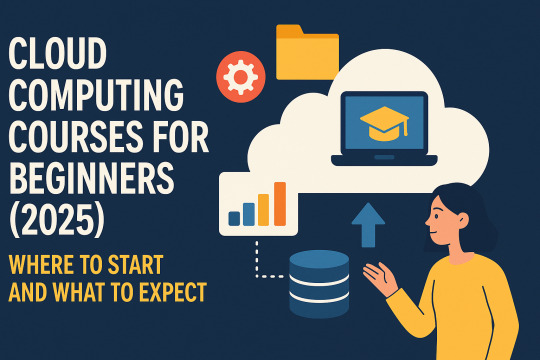
👨🎓 New to Tech? Wondering if You Can Learn Cloud Computing?
You’ve seen the job listings. You’ve heard about AWS, Azure, and Google Cloud. You might’ve even asked yourself, “Is this something I can learn, or is it only for experienced developers?”
Here’s the honest answer: Yes, you absolutely can learn cloud computing—even as a beginner. And no—you don’t need to be a coder to get started.
🧠 What Exactly Is Cloud Computing?
Let’s break it down in real-world terms.
Cloud computing is about accessing technology services (like servers, storage, and databases) over the internet instead of owning them physically. Just like you stream music without downloading every song, companies use cloud platforms to run apps without buying physical machines.
This makes cloud computing:
🔄 Scalable
⚡ Fast
💰 Cost-effective
🌐 Accessible from anywhere
Think of it as “IT on rent.”
🌐 What Are the Major Cloud Platforms?
There are three major players in the cloud computing space:
🔹 Amazon Web Services (AWS)
Largest market share globally
Great documentation and job demand
Ideal for beginners starting a cloud career
🔹 Microsoft Azure
Preferred by companies already using Microsoft services
Common in large enterprises and MNCs
Works well for IT support engineers or Windows admins
🔹 Google Cloud Platform (GCP)
Known for machine learning, analytics, and modern web apps
Growing ecosystem with startups and AI companies
Ideal for learners with interest in data + development
🎓 What to Expect from a Beginner-Friendly Cloud Course?
The right course should cover:
Cloud concepts: IaaS, PaaS, SaaS
Platform navigation (AWS Console, Azure Portal, GCP Dashboard)
Virtual Machines, storage, identity & access
Networking and basic security setup
Hands-on labs and small projects
Guidance for entry-level certifications
And most importantly, it should be beginner-friendly—not overloaded with theory or code.
🧑🏫 Why Learn Cloud with NareshIT?
At NareshIT, we’ve trained over 100,000 students in real-world IT skills. Our cloud computing courses are designed to help absolute beginners start from scratch, learn hands-on, and become confident enough to apply for jobs or certifications within weeks.
📘 NareshIT’s Cloud Computing Courses for Beginners
✅ AWS Cloud Foundations (Beginner Level)
Duration: 60 Days
Topics: EC2, IAM, S3, Lambda, VPC
Bonus: Live labs, project guidance, AWS Cloud Practitioner & Associate certification prep
Outcome: Ready for junior cloud jobs & support roles
✅ Azure Essentials Course (Beginner + Admin)
Duration: 45 Days
Topics: Azure AD, VMs, Blob Storage, Azure Monitor
Bonus: AZ-900 + AZ-104 prep, DevOps preview
Outcome: Ideal for support engineers and system admins
✅ GCP Starter Course (Beginner + Cloud Native Tools)
Duration: 30 Days
Topics: Compute Engine, IAM, BigQuery, Cloud Functions
Bonus: GCP Associate Cloud Engineer certification coaching
Outcome: Great for data lovers and devs entering cloud
🎓 DevOps with Multi-Cloud Training in KPHB by NareshIT
Located in Hyderabad’s tech-learning hub, NareshIT’s DevOps with Multi-Cloud Training in KPHB is tailored for:
✅ Beginners who want an IT job fast
✅ Professionals switching from support/manual testing
✅ Freshers looking for job-ready cloud + DevOps skills
🧾 Course Highlights:
Cloud Platforms Covered: AWS, Azure, GCP
DevOps Tools: Git, Jenkins, Docker, Kubernetes, Terraform
Duration: ~60 days
Batch Options: Weekday, Weekend, Fast-track
Includes: Real-world projects, certification support, job readiness prep
Location: KPHB, Hyderabad (Online + Offline options)
📅 New Batches Are Starting Now Choose from weekday, weekend, or fast-track options based on your schedule.
👉 Check NareshIT's Latest Cloud Batches Here
🧩 Bonus: Why Learning Cloud Computing Is Worth It
💼 High-demand job roles: Cloud support, DevOps, Admin
💸 Strong entry-level salaries: ₹4.5 to ₹7 LPA (for certified freshers)
🌱 Fast career growth: Start simple, grow into architecture or security
🌍 Global opportunities: Remote jobs across India, US, UAE, and more
You don’t need to master everything at once. Just start with one platform. And with the right mentor, you'll move faster than you thought possible.
#DevOpsWithMultiCloud#CloudCoursesHyderabad#LearnAWSAzureGCP#CareerInCloud#DevOpsForBeginners#CloudSkillsIndia#MultiCloudTrainingIndia#TechJobsHyderabad#CloudCertifications2025
0 notes
Text
ASP.NET Core: Why It’s Perfect for Backend Development
When it comes to mastering backend development in today’s competitive software industry, ASP.NET Core is one of the top choices. Its performance, flexibility, and modern features make it a strong foundation for building reliable web applications. If you're aiming to gain expertise in this area, the Best DotNet Training Institute in Hyderabad, Kukatpally, KPHB can help you learn everything from the basics to advanced concepts.
1. Cross-Platform Compatibility
ASP.NET Core runs on Windows, Linux, and macOS.
It allows developers to build and deploy applications on any OS.
This flexibility is ideal for businesses using diverse tech stacks.
2. High Performance and Scalability
Optimized for speed and low memory usage.
Supports asynchronous programming, which improves responsiveness.
Designed to handle high-load web applications and services efficiently.
3. Built-In Security Features
Offers integrated authentication and authorization tools.
Supports secure identity management (e.g., OAuth, OpenID Connect).
Helps developers build safe and secure backend services with minimal effort.
4. Modern Development Practices
Works well with REST APIs and microservices architecture.
Supports Docker for containerization and deployment.
Compatible with CI/CD tools and DevOps pipelines for smoother delivery.
5. Rich Ecosystem and Tooling
Visual Studio, Git, Azure, and more are all easily integrated.
Has strong support for Entity Framework Core for database operations.
Developers get access to a vast collection of open-source libraries.
6. Open Source with Microsoft Support
ASP.NET Core is fully open-source and community-driven.
Backed by Microsoft, ensuring regular updates and long-term support.
Extensive documentation and global community help in faster learning.
Conclusion
ASP.NET Core offers everything needed for robust and scalable backend development — from security to performance, modern tools, and cross-platform support. For aspiring developers, professional training is the best way to master these skills. Choose Monopoly IT Solutions Pvt. Ltd, a leader in tech education, to get expert training and real-time project experience in ASP.NET Core.
#best dotnet training in hyderabad#best dotnet training in kukatpally#best dotnet training in kphb#best .net full stack training
0 notes
Text
DevOps with Multi-Cloud:
A Beginner’s Guide Introduction In today’s fast-paced digital world, businesses need agility, reliability, and scalability. This is where DevOps with Multi-Cloud comes in.
By integrating DevOps practices across multiple cloud platforms, companies can optimize workloads, enhance security, and reduce vendor dependency.
If you’re looking for DevOps with Multi-Cloud Training in KPHB, this guide will help you understand the essentials.

What is DevOps with Multi-Cloud?
DevOps is a methodology that combines development (Dev) and operations (Ops) to streamline software delivery.
When paired with a multi-cloud approach—using multiple cloud providers like AWS, Azure, and Google Cloud—it brings flexibility and resilience to IT infrastructure.
Benefits of DevOps in a Multi-Cloud Environment Avoids Vendor Lock-in – Businesses can distribute workloads across different cloud providers.
Improved Disaster Recovery – If one cloud fails, another can handle operations. Cost Optimization – Companies can choose the most cost-effective cloud services.
Enhanced Performance – Running applications closer to users reduces latency.
Security & Compliance – Spreading workloads minimizes risks and ensures compliance with industry regulations. Key Components of DevOps with Multi-Cloud
CI/CD Pipelines – Automate code building, testing, and deployment. Infrastructure as Code (IaC) – Manage cloud resources using tools like Terraform or AWS CloudFormation.
Containerization & Orchestration – Docker and Kubernetes help maintain consistency across cloud environments. Monitoring & Logging – Tools like Prometheus and ELK Stack ensure system health.
Security & Compliance Automation – Integrate security into development workflows with DevSecOps. Challenges in Multi-Cloud DevOps
Complexity in Management – Handling multiple cloud platforms requires expertise.
Data Governance & Compliance – Managing regulations across different clouds is challenging.
Interoperability Issues – Ensuring seamless communication between cloud environments can be difficult. How to Overcome These Challenges?
Use multi-cloud management tools like HashiCorp Consul or Google Anthos. Implement automation to reduce manual configuration.
Follow best security practices to protect data across cloud platforms. DevOps with Multi-Cloud Training in KPHB If you’re in KPHB, Hyderabad, and want to master DevOps with Multi-Cloud, look for training programs that cover:
✔️ Hands-on experience with AWS, Azure, and Google Cloud
✔️ Real-world CI/CD pipeline implementation
✔️ Kubernetes & Docker container orchestration
✔️ Infrastructure as Code (IaC) with Terraform
✔️ Security best practices in a multi-cloud setup
FAQs
1. Why should I learn DevOps with Multi-Cloud?
DevOps with Multi-Cloud enhances career opportunities and helps businesses stay competitive in an evolving digital landscape.
2. Which cloud platforms are covered in multi-cloud training?
Popular platforms include AWS, Microsoft Azure, and Google Cloud Platform (GCP). Some courses also cover Oracle Cloud, IBM Cloud, and Alibaba Cloud.
3. What are the prerequisites for learning DevOps with Multi-Cloud?
Basic knowledge of cloud computing, Linux, and scripting languages like Python or Bash is helpful. However, beginner-friendly courses are available.
4. How long does it take to become proficient?
Depending on prior experience, 3-6 months of dedicated learning can help you gain proficiency in DevOps with Multi-Cloud.
5. Is certification necessary?
While not mandatory, certifications from AWS, Azure, or Google Cloud can boost your job prospects.
Conclusion
DevOps with Multi-Cloud is the future of IT infrastructure, offering flexibility, efficiency, and resilience.
If you're looking for DevOps with Multi-Cloud Training in KPHB,
start your journey today to gain the skills needed for a high-demand career.
#DevOps#MultiCloud#CloudComputing#AWS#Azure#GoogleCloud#Kubernetes#Docker#CICD#InfrastructureAsCode#Terraform#DevSecOps#HybridCloud#TechTraining#ITCareers#KPHB#Hyderabad#CloudSecurity#Automation#DevOpsEngineer#TechSkills#CloudNative#SoftwareDevelopment#ITTraining#CareerGrowth#CloudTechnology
0 notes
Text
Why .NET is the Backbone of Modern Applications and Web Development
Why .NET is the Backbone of Modern Applications and Web Development
In today’s rapidly evolving tech landscape, businesses and developers alike seek robust, scalable, and efficient solutions for application and web development. One framework that continues to stand the test of time is Microsoft’s .NET. For those looking to break into this powerful technology, finding the Best DotNet Training Institute in Hyderabad, Kukatpally, KPHB can be a game-changer in launching a successful career.
.NET has become the go-to framework for developing everything from enterprise-level software to dynamic web applications. Its versatility allows developers to build applications that work seamlessly across platforms, whether on desktop, web, mobile, or cloud. With the evolution into .NET Core and now .NET 6/7, it has become open-source, faster, and more efficient—making it highly suitable for modern development needs.
One of the key advantages of .NET is its vast class library and support for multiple languages like C#, F#, and VB.NET. This multi-language interoperability, coupled with excellent performance and security features, makes it ideal for developing high-performance applications. Furthermore, the integration of ASP.NET within the .NET ecosystem offers a streamlined approach to building modern, responsive, and secure web applications.
The .NET ecosystem is also supported by powerful development tools like Visual Studio, which enhances productivity through debugging, testing, and deployment features. It supports DevOps practices and integrates effortlessly with cloud services like Microsoft Azure, making it highly scalable and future-ready.
Moreover, .NET’s large community and continuous support from Microsoft ensure that developers have access to a rich pool of resources, documentation, and community-driven tools. Whether you're building a simple website or a complex enterprise solution, .NET provides the flexibility and power to get the job done efficiently.
Conclusion
In summary, .NET remains the backbone of modern applications and web development due to its flexibility, security, cross-platform capabilities, and strong community support. If you are looking to build a career in this high-demand domain, investing in the right training is essential. For top-tier learning and hands-on experience, Monopoly IT Solutions is your trusted partner in mastering .NET and stepping confidently into the world of modern software development.
0 notes
Text
Breaking into the Cloud Computing and DevOps Field: Where to Start?

The tech landscape is rapidly transforming, with cloud computing and DevOps at the forefront of this evolution. As businesses increasingly migrate their operations to the cloud and adopt agile practices, the demand for skilled professionals in these areas continues to rise. If you’re looking to break into this exciting field, one of the best first steps is to enroll in a cloud computing institute in Hyderabad. Here’s how to get started on your journey.
Understanding the Basics
Before diving into a career in cloud computing and DevOps, it’s essential to understand what these fields entail. Cloud computing involves delivering various services, such as storage, databases, and software, over the internet, enabling businesses to operate more efficiently. DevOps is a set of practices that integrates software development (Dev) and IT operations (Ops), fostering collaboration and streamlining workflows.
Understanding these concepts in cloud computing institute in Hyderabad lays the foundation for your career. Once you grasp the basics, you can focus on acquiring the necessary skills and knowledge.
Choosing the Right Cloud Computing Institute in Hyderabad
Selecting a reputable cloud computing institute in Hyderabad is crucial for your education and future career. Look for institutes that offer:
Comprehensive Curriculum: Ensure the program covers essential topics such as cloud service models (IaaS, PaaS, SaaS), deployment models, cloud security, and fundamental DevOps practices.
Hands-On Training: Practical experience is vital. Choose institutes that offer labs, projects, and internships to apply theoretical knowledge in real-world scenarios.
Industry Recognition: Look for programs that are well-regarded in the industry, ideally with partnerships or collaborations with leading tech companies.
Experienced Instructors: Learn from professionals with real-world experience who can provide valuable insights and mentorship.
Certifications: Opt for institutes that prepare you for industry-recognized certifications, such as AWS Certified Solutions Architect or Microsoft Certified: Azure Fundamentals. These credentials enhance your employability and credibility.
Building Your Skill Set
Once you’ve enrolled in a cloud computing institute in Hyderabad, focus on building your skill set. Key areas to concentrate on include:
Cloud Platforms: Familiarize yourself with major cloud service providers like AWS, Microsoft Azure, and Google Cloud. Understanding their services and offerings will give you a competitive edge.
Networking and Security: Learn about network configurations, security protocols, and compliance standards relevant to cloud environments.
DevOps Tools: Gain proficiency in popular DevOps tools such as Docker, Kubernetes, Jenkins, and Git. These tools are essential for automating processes and enhancing collaboration.
Scripting and Automation: Basic programming and scripting skills (Python, Bash, etc.) can significantly enhance your ability to automate tasks and manage cloud resources efficiently.
Gaining Practical Experience
Practical experience is crucial for solidifying your understanding and enhancing your resume. Participate in internships or collaborative projects during your training. Many cloud computing institutes in Hyderabad offer internship placements that can provide invaluable experience.
Additionally, consider contributing to open-source projects or creating your own projects. This hands-on experience not only helps you apply your skills but also demonstrates your initiative and problem-solving capabilities to potential employers.
Networking and Building Connections
Networking is essential in the tech industry. Attend workshops, webinars, and local meetups to connect with professionals and peers. Joining online forums and social media groups focused on cloud computing and DevOps can also help you stay updated on industry trends and job opportunities.
Leverage platforms like LinkedIn to showcase your skills, share your projects, and engage with industry leaders. Building a strong professional network can lead to mentorship opportunities and job referrals.
Exploring Career Opportunities
Once you’ve completed your training from cloud computing institute in Hyderabad and gained practical experience, it’s time to explore career opportunities. The job market for cloud computing and DevOps professionals is robust, with various roles available, including:
Cloud Engineer: Responsible for managing and implementing cloud services and solutions.
DevOps Engineer: Focuses on integrating development and operations to improve deployment efficiency and reliability.
Cloud Architect: Designs and oversees cloud infrastructure and strategy.
Site Reliability Engineer (SRE): Ensures systems' reliability and performance through proactive monitoring and incident management.
Many organizations are actively seeking talent in these roles, offering competitive salaries and benefits.
Continuous Learning and Development
The tech landscape is ever-evolving, making continuous learning vital. After starting your career, consider pursuing additional certifications or advanced training programs to keep your skills updated. This commitment to learning will enhance your career trajectory and keep you relevant in a competitive job market.
Conclusion
Breaking into the cloud computing and DevOps field may seem daunting, but with the right approach, it can be an exciting and rewarding journey. Start by enrolling in a reputable cloud computing institute in Hyderabad to gain the foundational knowledge and skills necessary for success. Focus on building your expertise, gaining practical experience, and networking within the industry. By taking these steps, you’ll be well on your way to establishing a fulfilling career in these dynamic and in-demand fields. Embrace the challenge, and you’ll find a world of opportunities waiting for you!
#technology#ai#devops#aws#Cloud Computing#cloud computing course in mumbai#cloud computing trends#cloud computing certification#cloud computing market#cloud computing training#cloud computing jobs#cloud computing course#DevOps#aws devops course in hyderabad#devops certification#DevOps training#DevOps course#DevOps training in hyderabad#aws training in hyderabad#aws cloud#aws certification#aws course
0 notes
Text
Innomatics Reviews – Career Tracks, Courses, Learning Mode, Fee, Reviews, Ratings and Feedback

Innomatics Research Labs is a leading institution empowering individuals in the digital realm through advanced training in various fields including IBM Certified Data Science, Machine Learning, Artificial Intelligence (AI), Full Stack Development, Amazon Web Services (AWS), DevOps, Microsoft Azure, Big Data Analytics, and Digital Marketing.
Committed to bridging the gap between theoretical learning and practical application, Innomatics aims to equip individuals with industry-relevant skills to thrive in their careers and drive business growth. Recognized as the Best Training Institute in Hyderabad by Times of India, Innomatics stands out for its hands-on training methodology and dedication to skill development.
Training at Innomatics goes beyond classroom lectures, offering participants opportunities to tackle real-world challenges and gain exposure to actual business scenarios. With a focus on providing hands-on experience and understanding of business case studies, the institution ensures that trainees are industry-ready upon completion of their programs.
As an IBM Certified Training Partner, Innomatics emphasizes not only on teaching algorithms but also on imparting practical knowledge through meetups, workshops, and hackathons. Their specialized placement program further enhances trainees' prospects by connecting them with over 100 businesses seeking skilled professionals to meet their objectives and drive growth.
Innomatics aspires to position India as a hub for analytics and artificial intelligence, catering to professionals across diverse industries including manufacturing, banking, insurance, retail, and healthcare. The institution collaborates with industry experts to demonstrate the benefits of its programs in improving decision-making and fostering innovation.
Founded in 2018, Innomatics has evolved into a premier training facility known for its practical approach and state-of-the-art training techniques. With founders Vishwanath Nyathani and Kalpana Katiki Reddy at the helm, both seasoned IT professionals with extensive experience in the banking and financial services domain, Innomatics is committed to empowering individuals to excel in their careers.
Innomatics offers a range of career tracks including Data Analyst, Machine Learning Engineer, Big Data Analyst, Data Scientist, AI and ML Developer, and Data Engineer. The institution's affiliations with prestigious institutions and companies, coupled with globally recognized certifications, ensure that students receive high-quality training and support to succeed in their careers.
Key features of Innomatics courses include high-quality education delivered by industry experts, practical training with real-life examples, and comprehensive support for career advancement. The institution's website provides detailed information about courses, certifications, and placement assistance, along with blogs and resources to keep students informed about industry developments.
Innomatics' Data Science Program, endorsed by IBM, offers a comprehensive curriculum covering Python, Data Analysis, Statistics, SQL, Machine Learning, Deep Learning, Computer Vision, and Natural Language Processing. With flexible training options and extensive practical training, the program equips students with the skills and knowledge required to excel in the field.
In conclusion, Innomatics Research Labs is a trusted institution that provides high-quality training and support to individuals pursuing careers in data analytics and machine learning. While some courses may require higher fees and technical knowledge, the institution's commitment to excellence ensures that students are well-prepared for success in the industry.
1 note
·
View note
Text
Docker Online Training | Visualpath
Docker Machine and Docker Swarm: How They Work?
Introduction:
Docker, with its containerization technology, has revolutionized how applications are built, shipped, and deployed. However, managing Docker containers across various environments can still be a daunting task, especially when dealing with multiple hosts or cloud providers. This is where Docker Machine comes into play, offering a streamlined approach to managing Docker hosts regardless of the underlying infrastructure. - Docker and Kubernetes Training
Docker Machine:
Docker Machine is a tool that enables developers to create and manage Docker hosts on local machines, remote servers, or cloud providers effortlessly. It abstracts away the complexity of setting up Docker environments by automating the provisioning process. With Docker Machine, developers can easily spin up multiple Docker hosts, each with its own configuration, to run containerized applications. - Kubernetes Online Training
Simplified Deployment Workflow:
One of the key benefits of Docker Machine is its simplified deployment workflow. Instead of manually configuring Docker hosts on different platforms, developers can use Docker Machine to automate the process. By simply running a few commands, they can create Docker hosts on local machines for development or on remote servers for production deployment.
Multi-Cloud Support:
Docker Machine offers support for multiple cloud providers, including Amazon Web Services (AWS), Microsoft Azure, Google Cloud Platform (GCP), and more. This allows developers to deploy Docker hosts on their preferred cloud infrastructure without having to deal with the intricacies of each provider's setup process. - Docker Online Training
Scaling with Ease:
Scaling containerized applications can be challenging, especially when dealing with a large number of Docker hosts. Docker Machine simplifies the scaling process by allowing developers to quickly add or remove hosts as needed. Whether it's scaling horizontally to handle increased traffic or vertically to accommodate resource-intensive workloads, Docker Machine provides the tools to effortlessly manage the underlying infrastructure.
Integration with Docker Swarm:
For orchestrating and managing clusters of Docker hosts, Docker Machine seamlessly integrates with Docker Swarm. Developers can use Docker Machine to create Swarm nodes across multiple hosts, enabling high availability and fault tolerance for their applications.
Conclusion:
In conclusion, Docker Machine is a powerful tool for simplifying the management of Docker hosts across various environments. By automating the provisioning process and providing support for multi-cloud deployment, Docker Machine enables developers to focus on building and deploying applications rather than worrying about infrastructure setup.
Visualpath is the Leading and Best Institute for learning Docker And Kubernetes Online in Ameerpet, Hyderabad. We provide Docker Online Training Course, you will get the best course at an affordable cost.
Attend Free Demo
Call on - +91-9989971070.
Visit : https://www.visualpath.in/DevOps-docker-kubernetes-training.html
Blog : https://dockerandkubernetesonlinetraining.blogspot.com/
#docker and kubernetes training#docker online training#docker training in hyderabad#kubernetes training hyderabad#docker and kubernetes online training#docker online training hyderabad#kubernetes online training#kubernetes online training hyderabad
0 notes
Text
How to Get the Most Out of Your DevOps Certification
In the rapidly evolving landscape of technology, DevOps has emerged as a crucial methodology to enhance collaboration and efficiency in software development and IT operations. As organizations increasingly prioritize DevOps practices, obtaining a DevOps certification becomes a valuable asset for professionals seeking to advance their careers. However, simply acquiring the certification is not enough; to truly reap the benefits, individuals must take strategic steps to maximize its value. In this blog, we'll explore how you can get the most out of your DevOps certification.
DevOps training in Hyderabad Where traditional boundaries fade, and a unified approach to development and operations emerges.
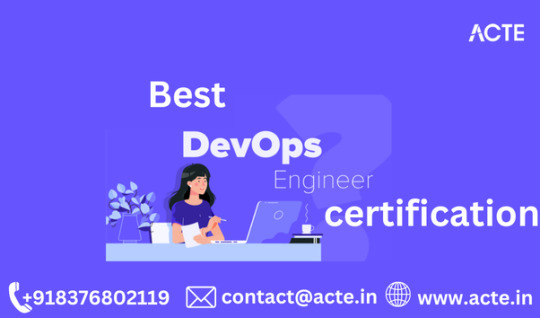
Understanding the Certification Landscape
1. Recognizing the Need for Certification
In the dynamic field of DevOps, certifications validate your skills and enhance your marketability.
Choosing the right certification depends on your career goals and the skills you want to acquire.
2. AWS Certified DevOps Engineer
Why AWS?AWS dominates the cloud computing space, and this certification focuses on DevOps practices within the AWS ecosystem. Ideal for professionals working extensively with AWS services.
3. Docker Certified Associate
Mastering ContainerizationDocker is pivotal in DevOps for containerization. This certification proves your proficiency in Docker and container orchestration. Suitable for those working on containerized applications.
4. Microsoft Certified: Azure DevOps Engineer Expert
Azure-Centric ExpertiseTailored for those working with Microsoft Azure, this certification emphasizes DevOps practices specific to the Azure platform. A valuable certification for organizations leveraging Azure services.
5. Red Hat Certified Engineer in DevOps
Open-Source ExcellenceIdeal for those inclined towards open-source technologies, especially Red Hat Linux.Focuses on DevOps principles within the Red Hat ecosystem.
6. Consider Your Career Path
Assess Your EnvironmentConsider the cloud platform or tools predominantly used in your workplace. Align your certification choice with the technologies relevant to your current or desired job role. Elevate your career prospects with our DevOps online course – because learning isn’t confined to classrooms, it happens where you are
7. Personalize Your Learning Path
Tailor Certifications to Your GoalsDevOps is diverse; your certification should align with your career goals. If your organization heavily uses AWS, the AWS Certified DevOps Engineer might be your best bet.
8. Keep Evolving
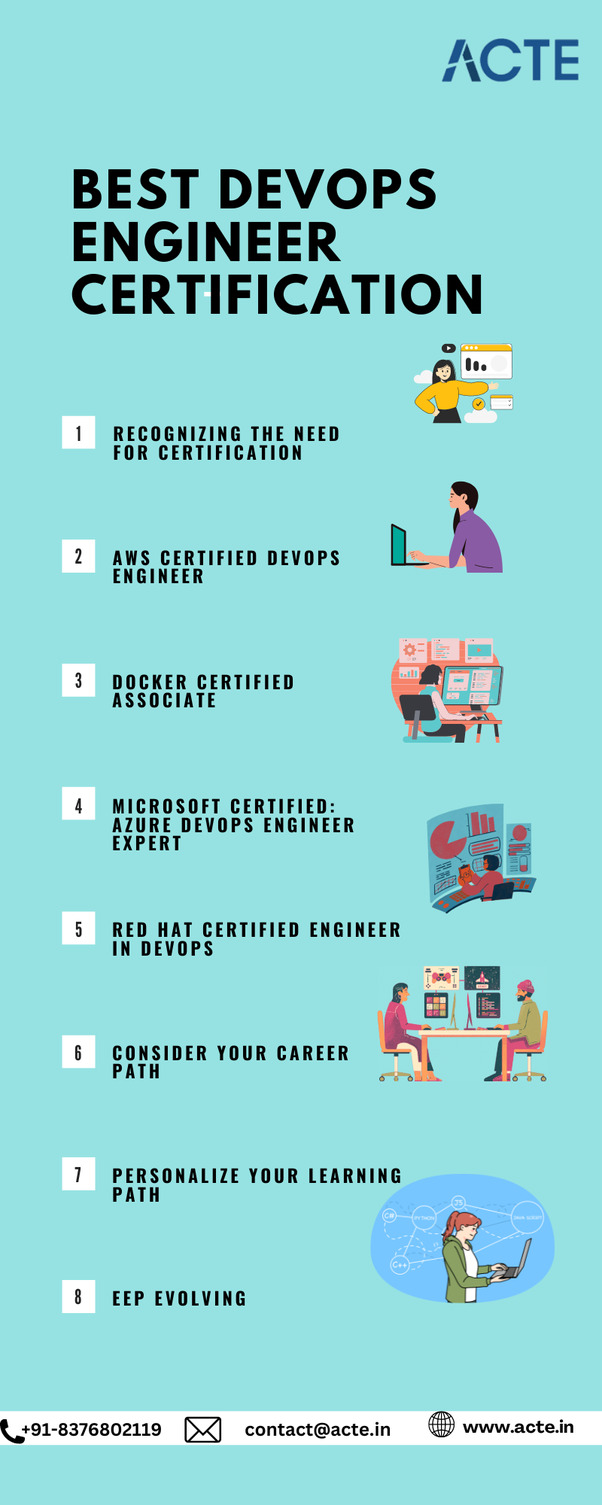
DevOps is DynamicThe best certification today might evolve tomorrow. Stay updated on emerging technologies and adapt your certifications accordingly. Continuous learning is a hallmark of a successful DevOps engineer.
Earning a DevOps certification is a commendable achievement, but its true value lies in how you leverage it to enhance your skills, contribute to your organization, and advance your career. By understanding core concepts, gaining hands-on experience, staying updated, engaging with the community, applying DevOps practices, seeking feedback, and documenting your achievements, you can maximize the benefits of your DevOps certification and position yourself as a valuable asset in the ever-evolving world of technology.
0 notes
Text
Mastering .NET Full Stack Development: The Ultimate Computer Training Guide
In today's fast-evolving digital landscape, mastering full-stack development is a crucial skill for aspiring developers. The .NET framework, developed by Microsoft, remains one of the most sought-after platforms for building robust web applications. A career in .NET Full Stack Development offers numerous opportunities, from front-end to back-end development, ensuring professionals stay competitive in the software industry.
Understanding .NET Full Stack Development
.NET Full Stack Development involves working on both the client-side and server-side of web applications. A proficient full-stack developer must be skilled in various technologies, including:
Front-End Development: Using HTML, CSS, JavaScript, and frameworks like Angular or React.
Back-End Development: Working with C#, ASP.NET Core, and Entity Framework.
Database Management: Handling SQL Server and integrating database solutions.
Cloud Services & DevOps: Utilizing Azure services and continuous integration tools.
By mastering these skills, developers can build scalable, secure, and efficient applications that cater to the growing needs of businesses and users worldwide.
Why Choose .NET for Full Stack Development?
The .NET ecosystem provides a powerful and versatile development platform with several advantages:
Cross-Platform Development: With .NET Core, applications can run seamlessly on Windows, macOS, and Linux.
High Performance: ASP.NET Core ensures optimized performance, making it ideal for modern web applications.
Strong Security Features: Built-in security mechanisms help protect against vulnerabilities.
Large Community Support: Microsoft’s support and a vast developer community ensure continuous improvement and assistance.
The Importance of Professional Training
To become a proficient .NET Full Stack Developer, formal training is essential. Enrolling in a structured program provides hands-on experience with real-world projects, helping learners understand the nuances of software development. The Best DotNet Training Institute in Hyderabad, Kukatpally, KPHB offers expert guidance, industry-relevant curriculum, and mentorship to equip students with the necessary skills.
Steps to Master .NET Full Stack Development
Learn the Basics: Start with fundamental programming concepts and object-oriented principles in C#.
Master Front-End Technologies: Gain expertise in HTML, CSS, JavaScript, and front-end frameworks.
Develop Back-End Skills: Focus on ASP.NET Core, MVC architecture, and API development.
Work with Databases: Understand SQL Server, database design, and query optimization.
Explore Cloud & DevOps: Learn about cloud hosting, deployment, and CI/CD pipelines.
Build Real-World Projects: Apply your knowledge through hands-on projects to gain practical experience.
Career Opportunities in .NET Full Stack Development
A .NET Full Stack Developer can explore multiple career paths, including:
Web Developer
Software Engineer
Cloud Application Developer
Enterprise Application Developer
DevOps Engineer
With businesses increasingly adopting digital solutions, the demand for skilled .NET developers continues to grow, offering lucrative career prospects and job stability.
Conclusion
Mastering .NET Full Stack Development opens doors to exciting career opportunities in the IT industry. Whether you are a beginner or an experienced developer, investing in professional training can accelerate your journey to becoming a full-stack expert. For the best learning experience, consider Monopoly IT Solutions, the leading institute that provides top-notch .NET training with real-world exposure and expert mentorship.
0 notes
Text
Unlocking the Power of DevOps on Azure: A Comprehensive Guide
In today's rapidly evolving technological landscape, the adoption of DevOps practices has become imperative for organizations striving to deliver high-quality software at a faster pace. Microsoft Azure, with its robust suite of cloud services, provides an ideal platform for implementing and maximizing the benefits of DevOps. This comprehensive guide will walk you through the key components, best practices, and tools available on Azure to unlock the full potential of DevOps.
Azure Overview
Azure is Microsoft's cloud computing platform, providing a wide range of services to help organizations build, deploy, and manage applications. When combined with DevOps practices, Azure becomes a powerful tool for achieving continuous integration and continuous delivery (CI/CD)."In the world of continuous improvement, DevOps training in Hyderabad is the compass that guides your team towards efficiency and innovation."
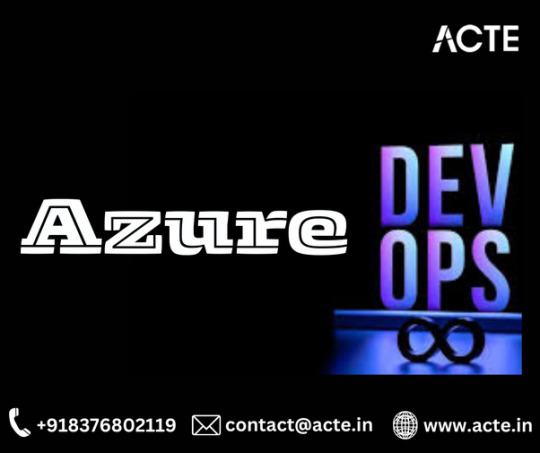
Integration with DevOps
Azure seamlessly integrates with popular DevOps tools and services, creating a robust ecosystem for application development. This integration ensures that development teams can leverage Azure's capabilities to streamline processes, automate tasks, and deliver software faster and more reliably.
Understanding DevOps on Azure
DevOps on Azure is a collaborative and streamlined approach to software development and IT operations, leveraging Microsoft's cloud computing platform, Azure. It combines the principles of DevOps with the robust features of Azure to enhance the entire development lifecycle.
1. Collaborative Development:
DevOps on Azure promotes collaboration between development and operations teams. It breaks down silos, fostering a culture where both teams work together seamlessly to achieve common goals.
2. Azure DevOps Services:
Azure offers a suite of tools known as Azure DevOps Services, covering version control, build automation, release management, and more. These services act as a central hub, providing a unified platform for efficient project planning, tracking, and execution.
3. Continuous Integration and Delivery (CI/CD):
Azure Pipelines, a key component, automates the build, test, and deployment processes, enabling teams to achieve continuous integration and continuous delivery. This results in faster and more reliable software releases.
4. Version Control with Azure Repos:
Azure Repos, integrated with Azure DevOps, provides robust version control supporting Git and TFVC. It ensures effective source code management and collaboration, crucial for a smooth development workflow.
5. Project Management with Azure Boards:
Azure Boards facilitates agile project management, allowing teams to plan sprints, track work progress, and manage backlogs. This ensures visibility and transparency throughout the development cycle.
"Break free from limitations. Our DevOps online course empowers you to upscale your skills, all from the comfort of your home."
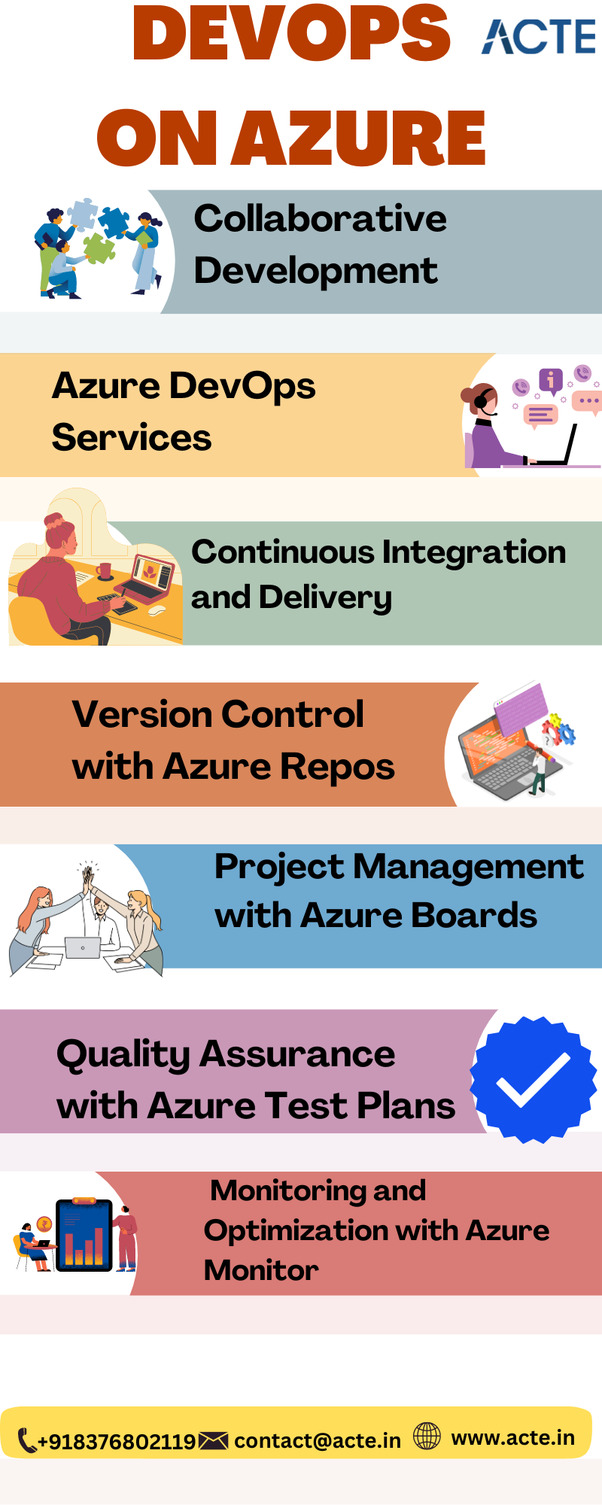
6. Quality Assurance with Azure Test Plans:
DevOps on Azure includes Azure Test Plans, a testing tool that assists teams in planning, tracking, and managing testing efforts. This ensures the quality and reliability of applications before deployment.
7. Monitoring and Optimization with Azure Monitor:
Azure Monitor provides comprehensive insights into the performance and health of applications and infrastructure. This monitoring solution allows proactive identification and resolution of issues, contributing to a more stable and reliable system.
Summarize the key takeaways from the guide, emphasizing the seamless integration of DevOps practices on Microsoft Azure. Encourage organizations to leverage the powerful combination of Azure's cloud services and DevOps principles to enhance agility, collaboration, and overall software delivery capabilities.
0 notes
Text
Unlocking Opportunities in Cloud Computing Courses in Hyderabad

In recent years, cloud computing has emerged as a transformative technology, revolutionizing the way businesses operate and deliver services. With its scalability, flexibility, and cost-effectiveness, cloud computing has become a cornerstone of digital transformation initiatives across industries. In Hyderabad, a thriving hub of technology and innovation, the demand for skilled cloud computing professionals is skyrocketing. As a result, there has been a surge in the availability of cloud computing courses, offering individuals the opportunity to acquire in-demand skills and unlock lucrative career opportunities in this dynamic field.
Rising Demand for Cloud Computing Professionals
Hyderabad, often referred to as "Cyberabad" due to its vibrant IT ecosystem, is home to a diverse array of technology companies, ranging from startups to multinational corporations. As these organizations increasingly migrate their infrastructure and applications to the cloud, there is a growing demand for professionals with expertise in cloud computing technologies. From cloud architects and engineers to cloud administrators and developers, skilled professionals who understand how to design, deploy, and manage cloud-based solutions are in high demand across the city.
Diverse Range of Cloud Computing Courses
Recognizing the burgeoning demand for cloud computing skills, educational institutions and training providers in Hyderabad have rolled out a diverse range of cloud computing courses catering to individuals at various stages of their careers. These courses cover a wide spectrum of topics, including cloud fundamentals, infrastructure as a service (IaaS), platform as a service (PaaS), software as a service (SaaS), cloud security, and more. Whether you're a novice looking to enter the field or an experienced IT professional seeking to upskill, there's a course tailored to your needs and aspirations.
Hands-On Learning and Certification Preparation
One of the hallmarks of cloud computing courses in Hyderabad is their emphasis on hands-on learning and practical experience. Many courses offer lab-based exercises, real-world projects, and case studies that allow students to gain practical experience working with cloud platforms such as Amazon Web Services (AWS), Microsoft Azure, and Google Cloud Platform (GCP). Additionally, several courses prepare students for industry-recognized certifications, such as AWS Certified Solutions Architect, Microsoft Certified Azure Administrator, and Google Cloud Certified Professional Cloud Architect, enhancing their employability and marketability in the job market.
Career Pathways in Cloud Computing
The completion of a cloud computing course opens up a plethora of career pathways for individuals in Hyderabad's thriving tech industry. Graduates of these courses may pursue roles such as cloud architect, cloud engineer, cloud administrator, DevOps engineer, solutions architect, or cloud security specialist, among others. These roles offer competitive salaries, opportunities for advancement, and the chance to work on cutting-edge projects for leading organizations in Hyderabad and beyond.
Industry-Relevant Curriculum and Networking Opportunities
Cloud computing courses in Hyderabad are designed to equip students with the skills and knowledge needed to excel in today's rapidly evolving tech landscape. The curriculum is often developed in collaboration with industry experts and reflects the latest trends, best practices, and emerging technologies in cloud computing. Moreover, many courses provide networking opportunities with industry professionals, guest lectures, and career counseling sessions, allowing students to connect with potential employers and mentors in the field.
Conclusion
In conclusion, cloud computing courses in Hyderabad represent a gateway to exciting career opportunities in one of the fastest-growing sectors of the technology industry. By acquiring skills in cloud computing, individuals can position themselves for success in a competitive job market and contribute to the digital transformation efforts of organizations across various industries. Whether you're a recent graduate, a mid-career professional, or an aspiring technologist, investing in a cloud computing course in Hyderabad can be a transformative step towards achieving your career goals and unlocking a world of opportunities in the dynamic realm of cloud computing.
0 notes